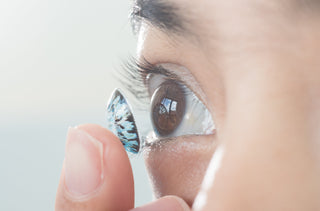As a child grows, refractive errors may slowly start to appear and they may not notice it. They might feel like their vision is perfectly normal: since it's natural for them to struggle to see things that are far away or to read small letters. That's one of the reasons why it's important that children visit their optometrist every year!
You might not be aware that your child is exhibiting signs of an eye condition, so we gathered here a few examples that could help you identify an underlying issue:
1. Their Grades Are Not as Good as They Use to Be
They might simply be struggling to see what's on the blackboard. It's also easy to lose academic motivation when extra efforts are required to complete homework or to take notes because words and numbers seem a little blurry!
2. They Struggle to Catch a Ball
When a ball is thrown, it moves really fast, and focusing on it is essential to be able to catch it. That's a skill that most children easily learn. But what if the ball appears blurry or slightly distorted? That makes it a whole lot trickier!
3. They Barely Play Outside
Did you know that children who play outside for at least 14 hours a week have 30% fewer chances of developing myopia?
4. They Run into Furniture, Doors and Walls often and/or Trip Easily
If the edges of things are hard to see, it can be a little harder to avoid them!

5. They Often Lose Things
They frequently ask you to help find a pen they were holding just a minute ago, and it's sitting in plain sight right on their desk?
6. They Complain About Headaches and/or Nausea in the Evenings or After Staring at Something for a While
Those are all signs of eyestrain that could be caused by having to use extra effort to focus.
If you notice any of those signs, refractive errors could be the cause. What are the solutions, then?
First, your child should visit the optometrist so that the eye doctor can conduct a comprehensive eye exam and identify any disorder.
Secondly, if your child needs vision correction, you'll have to choose between glasses or contact lenses to correct their vision. And yes, children can safely wear contacts as of 8 years old! Glasses are a good option for kids that are careful with their belongings, but in some cases, they can struggle with being teased by other children. Contact lenses are a great option for active children that could potentially drop their glasses, and here's another reason why it's probably the best option: In cases of myopia, the most common refractive error in children, there are actually contact lenses, made by CooperVision, that are developed specifically to significantly slow down the progression of the disorder! These specific lenses are the MiSight® 1-day lenses. Coopervision also has really interesting offers for first time wearers.
Book an appointment with an optometrist today to make sure your child's eye health is at its best!





















































